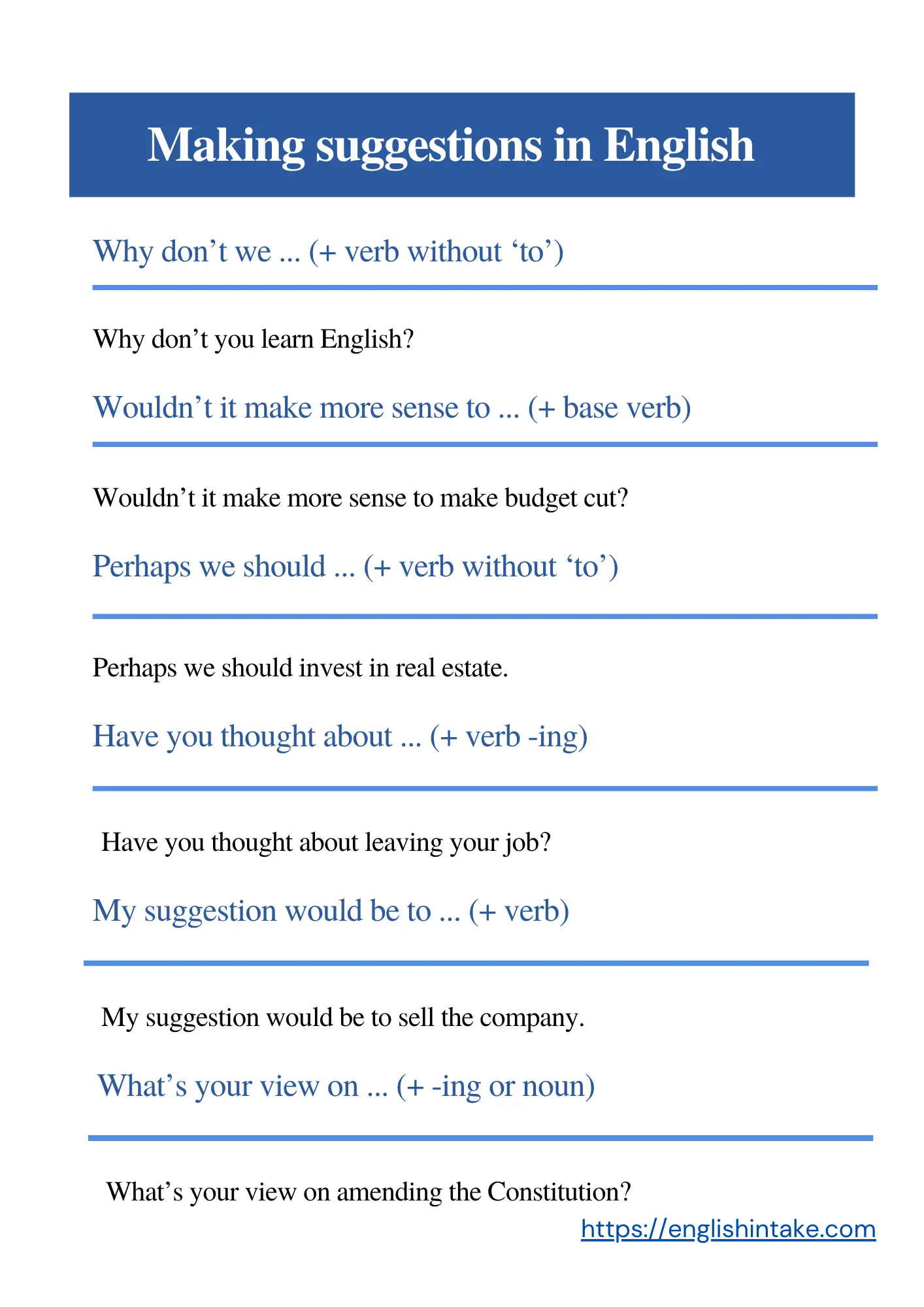1. Most common expressions and phrases to make suggestions
Making suggestions involves proposing a potential action or an idea to someone. To do this, there are various expressions and phrases you can use.
Why don’t we ... (+ verb without ‘to’)?1. Why don’t you break up with her?
2. Why don’t we stop collaborating with him?
3. Why don’t we share the costs?
What if we ... (+ verb without 'to')1. What if she doesn’t love me?
2. What if we die there?
3. What if he refuses to talk?
How about if we ... (+ verb without 'to')1. How about if we leave now?
2. How about if we wait a week?
3. How about if my father doesn’t agree with me?
Maybe we could ... (+ verb without 'to')1. Maybe you could try to repair it.
2. Maybe we could consider his idea.
3. Maybe we could ask my brother to help us.
Have you thought about ... (+ -ing)1. Have you thought about selling your car?
2. Have you thought about running for president?
3. Have you thought about leaving your job?
Why not ... (+ verb without 'to')1. Why not try again?
2. Why not call them now?
3. Why not join our team?
Shall we ... (+ verb without ‘to’)?1. Shall we start?
2. Shall we dance?
3. Shall we invite Alex?
It might be a good idea to ... (+ verb)1. It might be a good idea to leave early.
2. It might be a good idea to double-check it.
3. It might be a good idea to back up your files before you upgrade your computer.
We could possibly ... (+ verb without 'to')1. We could possibly make it happen.
2. We could possibly extend the trial.
3. We could possibly share resources.
What do you think about ... (+ -ing or a noun)1. What do you think about the new English teacher?
2. What do you think about adding a comment section to the blog?
3. What do you think about hiring a new coach?
How would you feel about ... (+ -ing)1. How would you feel about joining the military?
2. How would you feel about sharing your wealth with the poor?
3. How would you feel about joining the panel?
It could be beneficial to ... (+ verb)1. It could be beneficial to automate the process.
2. It could be beneficial to consult a specialist.
3. It could be beneficial to hire a new manager.
It might be better to ... (+ verb)1. It might be better to wait until you fully recover.
2. It might be better to ask for his opinion before we make a decision.
3. It might be better to meet online.
I suggest that we ... (+ verb without 'to')1. I suggest that you start working on it as soon as you can.
2. I suggest that you ask for your parents’ opinion.
3. I suggest that we stop collaborating with her. She is not reliable
One possibility could be to ... (+ verb)1. One possibility could be to harden the law on the use of social media.
2. One possibility could be to change the constitution.
3. One possibility could be to merge teams.
Perhaps we should ... (+ verb without 'to')1. Perhaps we should save some money.
2. Perhaps you should stop working with him.
3. Perhaps we should meet tomorrow.
Suppose we ... (+ verb without 'to')1. Suppose I quit my job, then what am I going to do?
2. Suppose we managed to sell the company, then what will we do next?
3. Suppose he breaks up with her. What about the children?
Are you up for ... (+ -ing or a noun)1. Are you up for a coffee?
2. Are you up for a bike ride?
3. Are you up for selling your house?
Should we consider ... (+ -ing)1. Should we consider extending the deadline?
2. Should we consider hiring another editor?
3. Should we consider tightening the budget?
Would you like to ... (+ verb)?1. Would you like to join us for coffee?
2. Would you like to go now?
3. Would you like to have a look at the report before I send it?
It’s worth considering ... (+ -ing or a noun)1. It’s worth considering changing some of your habits.
2. It’s worth considering how these rules might demotivate the employees.
3. It’s worth considering changing our policies.
I was thinking we could ... (+ verb without 'to')1. I was thinking we could consider selling this house; it’s getting old.
2. I was thinking we could ask Lucas to go with us.
3. I was thinking we could enrol him in a Karate class.
Have you considered ... (+ -ing)1. Have you considered moving to London?
2. Have you considered changing your name?
3. Have you considered learning Python?
My suggestion would be to ... (+ verb)1. My suggestion would be to postpone the meeting until next week.
2. My suggestion would be to talk to your wife first.
3. My suggestion would be to reduce the price.
Wouldn’t it be nice to ... (+ verb)1. Wouldn’t it be nice to have a lot of money?
2. Wouldn’t it be nice to live in a clean house?
3. Wouldn’t it be nice to travel together?
Could we ... (+ verb without 'to')1. Could we meet tomorrow?
2. Could you make this code faster?
3. Could you simplify the roadmap? It’s too complicated.
Let’s ... (+ verb without ‘to’)1. Let’s not make a big deal out of it.
2. Let’s revisit the plan.
3. Let’s invite the whole team.
I propose we ... (+ verb without 'to')1. I propose we make a budget cut for next year.
2. I propose we allocate more resources to research and development.
3. I propose we organise a referendum before the presidential election.
How does ... (+ -ing) sound?1. How does joining a fitness class sound?
2. How does moving the yoga class to Fridays sound?
3. How does sharing the costs sound?
What’s your view on ... (+ -ing)1. What’s your view on investing in real estate?
2. What’s your view on changing suppliers?
3. What’s your view on remote work?
What about ... (+ -ing)?1. What about moving to Paris?
2. What about merging the two teams?
3. What about doing some freelance work?
Are you keen on ... (+ -ing)1. Are you keen on leading the session?
2. Are you keen on mentoring interns?
3. Are you keen on testing our new software?
How about ... (+ -ing)?1. How about changing the way we teach?
2. How about using tablets at school?
3. How about teaching children how to use social media?
Would it make sense to ... (+ verb)1. Would it make sense to teach children about sexuality?
2. Would it make sense to remove exams in school?
3. Would it make sense to switch to a new provider?
Wouldn’t it make more sense to ... (+ verb)1. Wouldn’t it make more sense to hire a freelancer?
2. Wouldn’t it make more sense to sell the seized assets?
3. Wouldn’t it make more sense to liberate all political prisoners before organising an election?
2. Responding to suggestions
1. That sounds like a great idea.
2. Fantastic idea.
3. I think that would work well.
4. I’m not sure about that.
5. I’m not really convinced about that.
6. That’s an interesting suggestion, let’s consider it.
7. I love that idea!
8. Perhaps we could modify that slightly.
9. I’m totally up for it!
10. It could work, but we might need to think about the details.
11. I’m open to that idea.
12. Let’s explore that option further.
13. I’m not convinced that would work, but I’m willing to discuss it.
14. That’s a possibility, but let’s keep other options open.
15. Why not? Let’s give it a try.
16. That doesn’t really appeal to me, to be honest.
17. I’d prefer if we could find an alternative.
18. That’s a good point, we should definitely consider it.
19. Can we think about some other possibilities as well?
20. That seems like the best option we have right now.
21. I’m not entirely sure. Can we discuss it a bit more?
22. Yes, that could work, but let’s weigh the pros and cons.
23. That’s a no from me, sorry.
24. I’m all for it, let’s do that!
25. Can we brainstorm a bit more before deciding?
26. I’d like to know more before making a decision.
27. That’s an option, but it might not be the most practical.
28. I’m not too keen on that idea.
29. Yes, but we might need some adjustments.
30. That could be a bit challenging, but it’s worth a shot.
31. Let’s try it out and see how it goes.
32. That’s a bit too risky.

